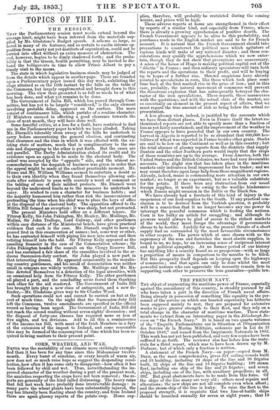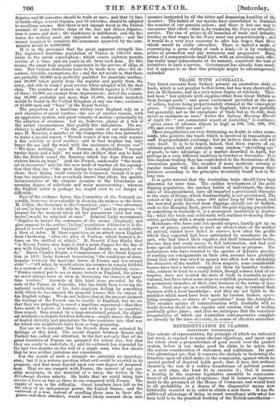THE FRENCH NAVY.
TITE object of augmenting the maritime power of France, especially against the ascendancy of this country, is steadily pursued by all who have taken a part in the direction of French naval affairs. Being already in possession of something like equality in the per- sonnel of the service on which our boasted superiority has hitherto been supposed mainly to rest, they are prepared for extensive works to give greater strength to their fleet, and they rely on a total change in the character of maritime warfare. These state- ments we extract from an interesting paper in the Edinburgh Re- view on "the French Navy." It is based on two quarto volumes of the " Enquete Parlementaire sur la Situation et l'Organisation des Service de la Marine Militaire, ordonnee par la Loi du 31 Octobre 1849," and issued from the Imprimerie Nationale in 1852. This work has not yet been published, and very few copies have been suffered to go forth. The reviewer also has before him the mate- rials for a third report, which was to have been drawn up by M. Dufaure, but of which only a fraction is written. A statement of the French Navy—on paper—copied from M. Darn, as the most comprehensive, gives 224 sailing-vessels built and 53 building, including 24 ships of the lino and 38 frigates built, 22 ships of the line and 18 frigates building; 108 steam fleet, including one ship of the line and 21 frigates ; and .seven ships, including one of the line, with auxiliary propellers; in all, 392. But great abatements have to be made from this force. Of the ships of the line many are very old ; others need repairs and alterations ; the new ships are not all complete even when afloat ; and the steam-ship of the line is leaky. To raise the fleet to the proposed strength, it is requisite that two line-of-battle ships should be launched annually for seven or eight years ; that 19
frigates and 30 corvettes should be built at once; and that 12 line- of-battle ships, several frigates, and 12 corvettes, should be adapted to auxiliary screws. But there is not enough wood in the French arsenals to make twelve ships of the line and fifteen frigates ; iron is scarce and dear ; the machinery is indifferent, end the fac- tories for making more are imperfect or inadequate ; and the money required to complete the armament approved by the com- mission would be 4,000,000/.
It is in the personnel that the great apparent strength lies. The registered maritime population of France is 139,310 men, liable to the naval conscription ; which exacts eighteen months service at a time' and six years in all, from each man. By this means, the great bulk acquire experience in the service of ships of war. But various deductions have to be made here also—for ab- sentees, invalids exemptions, &c. ; and the net result is, that there are probably 40,000 men perfectly qualified for maritime warfare, and 20,000 taken partly from the register and partly from the army, and able to render good service when mingled with the first class. The number of seamen on the British register is 175,000: of these 53,000 are exempt from impressment ; and of the remain- ing 80;000 probably not more than 21,000, invalids included, would be found in the United Kingdom at any one time, exclusive of 45,000 men and "boys" in the Royal Service.
The projectors of a maritime victory over England rely on a new character of naval warfare—the use of smaller vessels, with an aggressive system, and great velocity of motion—principally by the adoption of steamers. Let us, however, glance at a few of the actual circumstances that qualify this calculation. The ma- chinery is indifferent. "In the present state of our machinery," says M. Maissiat, a member of the Committee who was instructed to make a special report, "French vessels of war can only acquire a fair velocity in good weather, and in foul weather can only brave the sea and the wind with the assistance of foreign coal.' "We have nothing," says M. Norman a shipbuilder, "beyond twelve knots and a half: we want the swiftest that can be built, like the British vessel the Banshee, which has done fifteen and sixteen knots an hour." And the French, confessedly "the weak- est in resources," rely for this new mode of warfare on the assump- tion that they are "the most daring by national character." On shore, their daring could scarcely be surpassed, though it is per- haps too impulsive ; but everybody knows that afloat, the ignoble inconveniences of the element occasion to the Frenchman an amusing degree of solicitude and noisy manceuvering ; whereas the English sailor is perhaps too stupid even to see danger or difficulty. Part of the evidence before this Committee of the National As- sembly, however, is as valuable in showing the animus as the facts. M. Collas, the Secretary to the Committee, says—" Our adversary [at sea] is known : it can only be England"; and he proposes "to prepare for the moment when all her possessions [and her com- merce] would be attacked at once." Admiral Leine recommends "frigates to harass the commerce of the enemy [England], and give support to the native [Indian] population whenever it is dis- posed to revolt against England." Another witness would strike a blow at Aden. M. Daru expatiates on an attack upon England from Cherbourg, "after the plan of Vauban, which framed a de- fence on the method of attack." M. Benoist d'Azy thinks that "in Russia France may hope to find a point d'appui for the day of war with England ; a war which England dreads as much as we do." Baron Charles Dupin, a Commissioner of the Great Exposi- tion in 1851, looks forward to restoring "the conditions of coun- terpoise between the maritime forces of France and her eternal rival"—" till when, he would advise his country to remain faithful to a system of peace." M. Charmer, now a Rear-Admiral, says—. "France cannot put to sea as many vessels as England, the power we must always have in view in discussing the chances of mari- time warfare.' Avowals of this kind were preceded by the note of the Prince de Toinville, who has lately been reviving the national recollection of his Anti-Anglican feeling by something with which he has amused the peaceful leisure that he enjoys in his English refuge. We do not believe that at the present moment the feelings of the French can be hostile to England, but we see that they are preparing to assert a maritime supremacy—that they have made it a point of honour; and with a people so sensitive, thus armed, thus guided by a long-entertained project, the slight- est accident—a dispute between fishermen—might arouse the flame of heated chivalry and precipitate the two countries into that war for which our neighbours have been so long preparing. Nor are we to consider that the French alone are actuated by feelings of this kind. The recent dispute between Russia and Turkey has called our attention, to the fact not only that all the great countries of Europe are prepared for actual war, but that they are ready to undertake it ; and its outbreak has depended for the last two months on the will of a single man, who has shown that he was neither judicious nor considerate.
For the result of such a struggle we entertain no apprehen- sion; but it is a serious question what evil could be averted in its progress, and that must depend upon our own degree of prepared- ness. That we can compete with France, the nearest of our pos- sible assailants, in the material of a navy, the writer in the Edinburgh Review admits. He holds that we could bring into service a force as two or three to one compared with France. The supply of men is the difficulty. Great numbers have left us for the navy of an independent power, the United States; and the outbreak of a war, instead of recalling those men to their alle- giance and their standard, would most likely convert them into enemies instigated by all the bitter and despairing hostility of the deserter. The habits of our marine have contributed to diminish the number of our genuine sailors ; and there is but one way to encounter that effect—that is, by rendering the Navy an attractive service. The rise of prices in all branches of trade and industry teaches us that wages in the Navy must rise proportionately ; and it would be a very poor economy to offer less wages than those which would be really attractive. There is indeed a mode of economizing a gross outlay of such a kind,—it is by rendering- prizes of promotion and pay numerous and progressive. Many prizes of a comparatively small kind, with an ascending scale offer- ing really large inducements at its summit, constitute the best of incentives in such a service. Government has already done much, but it appears to us that this principle might be advantageously extended.



































 Previous page
Previous page